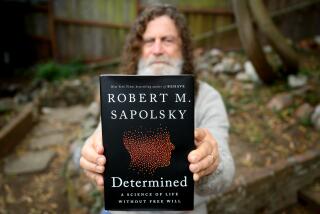Researcher’s Finding Stirs Debate on Homosexuality : Medicine: Gay activists praise the study that offers the first evidence that sexual orientation is not determined by choice.
- Share via
Gays and parents of gays in Orange and Los Angeles counties on Friday praised a new scientific study indicating that homosexuality is determined by physiology rather than conscious choice.
“Personally, I am elated about this study,” said Melvin A. Trickey of Covina, who is co-chairman the Parents and Friends of Lesbians and Gays of Orange County. “Some in the religious communities constantly harp on ‘choice,’ ” said Trickey, whose son and daughter are gay. “The only choice gays and lesbians have is whether to live in a closet or to live outside and to accept themselves.”
For the record:
12:00 a.m. Oct. 3, 1991 For the Record
Los Angeles Times Thursday October 3, 1991 Home Edition Metro Part B Page 1 Column 1 Metro Desk 2 inches; 67 words Type of Material: Correction
Karl Stange--An article appearing in the Aug. 31, 1991, editions of The Times included an interview with Karl Stange. The article implied that Mr. Stange is homosexual. Mr. Stange has written The Times stating that he is not homosexual.
The subject of the article was public reaction to a recent medical study which discovered some differences in the brains of homosexual and heterosexual men.
The Times sincerely regrets any problems this article may have caused Mr. Stange.
The study, published in the journal Science, said a small portion of the brain may determine whether one is homosexual or heterosexual. The study was done by Dr. Simon LeVay, a respected neurobiologist at the Salk Institute in La Jolla.
Elizabeth Cowan of Costa Mesa said Friday that she thinks the new study is “very exciting. It’s something that we’ve all thought about and struggled with in our coming-out process--why we are the way we are.”
Cowan, who is co-chair of the Elections Committee of the County of Orange, a political action group for gays and lesbians, said LeVay’s study should prompt “more scientific exploration.”
Dan Wooldridge of Laguna Beach also called for more scientific study of the topic. He said the issue is important because “it’s something we’ve been trying to get across to the right wing for decades: sexual orientation is innate, it’s not a choice.”
Wooldridge is chairman of the board of the Gay and Lesbian Community Services Center of Orange County. In an interview on Friday, he said he believes a study about the cause of homosexuality is not as important to the gay community as is the need for civil rights protection.
“In terms of seeking equal protection under the laws, causation (of homosexuality) is not important,” Wooldridge said. “This study doesn’t have any impact on the struggle of the gay community to be treated equally. That’s our primary issue.”
But Wooldridge said the LeVay study is valuable since it creates greater awareness that people do not “choose” whether they will be homosexual or heterosexual. “Actually, the term ‘sexual preference’ is inaccurate,” he said. “The accurate term is ‘sexual orientation.’ ”
In Los Angeles County, some in the gay community expressed a wide range of opinion on the study, from fears it will unleash a wave of new anti-gay persecution, to joy that long-held beliefs about homosexuality not being a matter of choice may be scientifically provable. Some predicted the findings will weaken the case of those who think that being gay is the result of a sinful, reversible personal decision.
Because the findings were based on a relatively small sample some scientists have urged caution about drawing conclusions until additional studies are done.
LeVay, in his study, examined slices of brain from 41 autopsied bodies: 19 gay men, 16 men who were presumed to be heterosexual and six presumed heterosexual women. All of the gay men died of AIDS.
The scientist, who is gay, found that a tiny region of the hypothalamus that is believed to govern sexual behavior was larger in the heterosexual men--though still only the size of a grain of sand--than in the females and gay men.
Among those questioned at random in Los Angeles was Karl Stange, who said, “A lot of people are making an awful lot of an awful little. Any social policy implications (from the study) are pretty far-fetched.”
Others, however, believed as LeVay did that the findings, especially if borne out in further studies, bolster the notion that the term “sexual preference” is a misnomer.
“I didn’t one day decide this is what I want to be,” said Gene Branum, a gay man who lives in West Hollywood. “I think this idea will bring to light that we are normal people.”
David Smith, a gay man who is spokesman for the Gay and Lesbian Community Services Center in Hollywood, said he was “enthusiastic” about LeVay’s findings.
“It puts a whole new series of questions on the table,” Smith said. “I’m excited because it verifies my thinking that gayness is not behavior for which people have a choice.”
Smith fears that critics may use the findings to further their argument that homosexuality is an abnormality that society should oppose. “But those would be the people who are grasping at straws anyway to further their political agenda of gay bashing,” Smith said.





